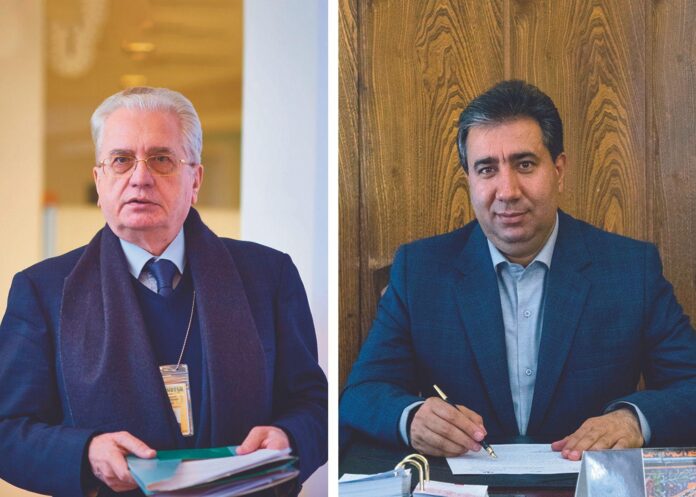Russia’s State Hermitage Museum—cut off from its former Western museum partners since Russia invaded Ukraine in 2022—has signed a wide-ranging cooperation agreement with Iran’s Cultural Heritage and Tourism Research Institute.
The Hermitage’s veteran director Mikhail Piotrovsky, a vocal supporter of the war in Ukraine who has had close ties to Vladimir Putin since the 1990s, was recently added to Canada’s list of Russians sanctioned due to the war. He signed a memorandum of understanding at the museum on 2 September with the Iranian archaeologist Mostafa Dehpahlavan, director of the Islamic republic’s heritage institute. In addition to running the Hermitage for decades, Piotrovsky is dean of the Faculty of Asian and African Studies at St Petersburg State University.
A statement on the museum’s website says the Hermitage and the Iranian institute will collaborate on archaeological expeditions, cultural heritage restoration projects, academic publications and professional development opportunities for young scholars. It also describes joint exhibitions as “a compulsory part of the agreement” by which “the Hermitage will host Days of Iran, while Hermitage Days will take place in Tehran”. According to Iranian and Russian media, Piotrovsky also held further talks with Jabriel Noukandeh, the head of the National Museum of Iran.
Western political commentators have characterised Russia’s diplomatic alliances with countries such as Iran, North Korea and Myanmar as “pariah solidarity”. Vladimir Putin and Kim Jong Un promised that economic, humanitarian and cultural issues would be on the agenda of their highly anticipated summit on 13 September. In Moscow, the Second World War history museum known as the Victory Museum held a conference in May marking the 70th anniversary of the end of the Korean War, during which the Soviet Union supported North Korea. The museum’s director, Aleksandr Shkolnik, was the first Russian museum leader to be sanctioned after the invasion of Ukraine.
The Hermitage’s warm relations with Iranian museum officials and scholars pre-date the war, with an online conference taking place during the Covid-19 pandemic in 2020. Four years earlier, the two countries held talks on their aspirations to open up to international tourism. The St Petersburg museum has one of the world’s richest collections of Iranian art, ranging from the third century to the end of the Qajar dynasty in the early 20th century. It unveiled a revamped permanent display of the Art of Iran in 2021 and now offers a virtual tour.
A research paper published in 2020 in the Journal of Material Cultures in the Muslim World documented how “stolen luster tiles” from Imamzadeh Yahya, a tomb in Varamin, south of Tehran, that was decorated between 1260 and 1310, are held in foreign museums, “especially the Hermitage and V&A”. Last month, the Tehran Times wrote that “Imamzadeh Yahya’s bitter fate highlights an urgent need for enhanced international cooperation, awareness, and legal measures to protect global heritage”.
Russia’s official foreign policy strategy, approved by Putin earlier this year, prioritises “the full-scale and trustful cooperation with the Islamic Republic of Iran” with the goal of “promoting interfaith and intercultural dialog and understanding, consolidating efforts to protect traditional spiritual and moral values”. Relations with such “friendly” states are described in contrast to the “aggressive policy” of “most European states”, seen as “undermining domestic political stability and eroding traditional Russian spiritual and moral values”.
Amid a crackdown on LGBTQ+ and women’s rights in Russia, Iran has drawn closer after the “Woman, Life, Freedom” uprising gripped the country following the death of Mahsa Jina Amini in police custody in 2022.
Historically, however, Russian-Iranian relations have been far from smooth. The Russian ambassador to Qajar Iran, Alexander Griboyedov, was killed in Tehran in 1829 by an angry mob as a result of a Russian treaty forcing Iran to cede its Caucasus territories. The Treaty of Turkmenchay ended the Russo-Persian War.

























